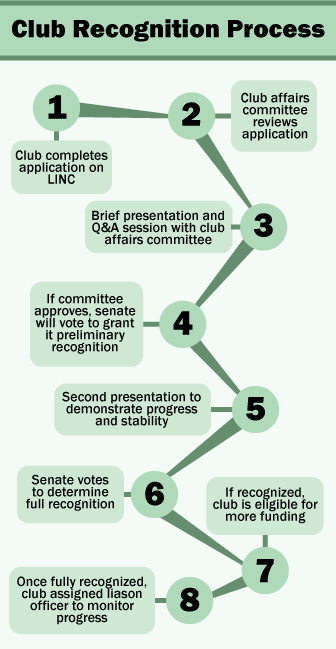This article is part of a series about the role of Student Senate on Lehigh’s campus.
There are approximately 300 Student Senate recognized clubs at Lehigh.
The Student Senate club affairs committee determines which clubs Senate officially recognizes. The committee then monitors these recognized clubs to ensure they meet Senate’s standards. Recognized clubs are accepted, not endorsed, by the university.
Recognized clubs receive funding, a table at the club fair and other university resources such as a group page on LINC — an online platform for student involvement opportunities — and access to support from the Office of Student Activities. Recognized clubs also have the ability to reserve rooms in university buildings.
To become a recognized club, an organization must first complete an application online through LINC. Once a club has applied, the club affairs committee reviews its application to determine if the club fits Senate’s standards. The club must consist primarily of undergraduates, have an executive board of all undergraduates and submit a petition signed by at least 25 students interested in the club.
“When clubs come to present (to Senate), a lot of them are just ideas and haven’t really had meetings yet,” said Jacy Herman, the chair of the club affairs committee. “When clubs have already met or already had events or kind of gone in the direction they plan to, then it’s a lot easier for us to say, ‘We know what direction they’re going, we know what they want to do, and who they’re going to appeal to on campus.'”
The club must prove there is student interest and that it can provide some benefit to the Lehigh community. The club cannot be similar to existing recognized clubs and cannot violate any university policies. The club affairs committee will then ask the organization to give a brief presentation and complete a Q&A session with the committee.
“With some clubs, they just kind of do it for the money,” said Danny Moncada, ’18, a member of the club affairs committee. “For example, we had one club which was just watching movies, and we get that that can be a communal thing, but that’s something you can do on your own time. It’s not something that immediately needs senate funding.”
If the committee approves the club, it will then be taken to a vote in the next full Senate meeting to grant it preliminary recognition. If the application is denied, the club can apply again immediately.
The preliminary recognition phase lasts at least 15 weeks. During this period, clubs have access to resources of fully recognized clubs but are not eligible for the same amount of funding as recognized clubs.
Following the preliminary recognition phase, the club must again present to the club affairs committee to show it has made progress, is stable and uses good financial practices. The committee then gives its report and recommendation to the full Senate, and members vote to determine full recognition status.
If recognized, the club continues as is and becomes eligible for more funding. If the club is rejected completely, the organization can reapply for recognition in another 15 weeks. Senate can also vote to extend the preliminary recognition phase for another 15 weeks, after which members would vote on the club’s recognition.
Once a club is fully recognized, it receives a liaison officer and a member of the club affairs committee who monitors progress and ensures the club follows university and Senate guidelines, as well as the club’s own constitution. Clubs that violate any of these rules or improperly use funds can have their recognition revoked by Senate.
“(When you’re fully recognized), Senate can be there to help you out and give you guidance in your club and just kind of make sure that you’re being the best club you can possibly be,” said Jon Ross, ’17, a member of the club affairs committee.
Ross said despite the rigorous process, dozens of clubs make it through to full recognition each semester.





Comment policy
Comments posted to The Brown and White website are reviewed by a moderator before being approved. Incendiary speech or harassing language, including comments targeted at individuals, may be deemed unacceptable and not published. Spam and other soliciting will also be declined.
The Brown and White also reserves the right to not publish entirely anonymous comments.